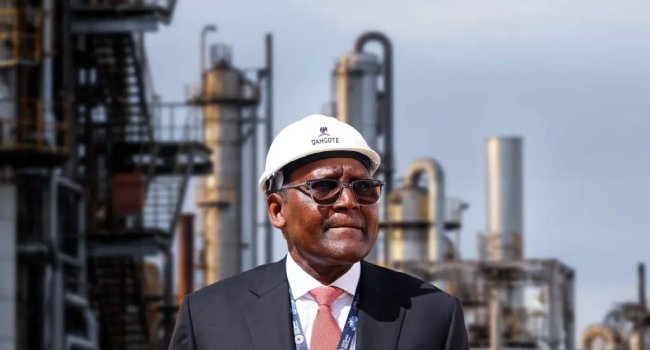RDi Organisation of di Petroleum Exporting Countries (OPEC) don highlight di impact of di Dangote Refinery on global fuel markets, noting say its production don significantly reduce Nigeria’s reliance on imported refined petroleum products from Europe.
For di Monthly Oil Market Report wey dem publish on January 15, 2025, OPEC state say di Lagos-based refinery’s gasoline production and exports to international markets dey reshape global gasoline supply patterns.
How Dangote Refinery take help Nigeria
Di report state say “di ongoing operational ramp-up efforts at Nigeria’s new Dangote refinery and its gasoline exports to di international market go likely weigh further on di European gasoline market.
Continued gasoline production in Nigeria… go most likely free up gasoline volumes in international markets, calling for new destinations and flow adjustments for di extra volumes.” Nigeria, despite being Africa’s largest oil producer, don face decades-long energy challenges, with its state-owned refineries largely non-functional.
Dis don force di country to rely heavily on imported refined products, a trend worsened by fuel price hikes following di removal of subsidies in May 2023. Prices don soar from ₦200/litre to around ₦1000/litre, exacerbating economic pressures on citizens wey already dey grapple with inadequate power supply.
Petrol Production At Dangote Refinery Is Affecting The European Market
The production of petrol at the Dangote Refinery is indeed having an impact on the European market, as confirmed by reports from the Organization of the Petroleum Exporting Countries (OPEC). The refinery,… pic.twitter.com/hVS5Z4ECKi
— African Hub (@AfricanHub_) January 16, 2025
Di future of Nigeria’s Energy Sector
Di $20 billion Dangote Refinery, wey be owned by Africa’s richest man, Aliko Dangote, begin operations in December 2023 with an initial capacity of 350,000 barrels per day (bpd). It aim to achieve full capacity of 650,000 bpd by di end of 2025.
Di refinery already dey supply diesel, petrol, and aviation fuel to marketers across Nigeria. Dis development mark significant milestone for Nigeria’s energy sector, potentially easing fuel shortages and reshaping di country’s fuel import dependency.
Di impact of Dangote Refinery on Nigerians
Di reduction in fuel import from Europe go likely have positive impact on Nigerian citizens, wey don suffer from high fuel prices and inadequate power supply.
Di Dangote Refinery go help to increase di availability of fuel in di country, reduce di prices, and improve di overall energy sector. According to di Nigerian National Petroleum Corporation (NNPC), di refinery go save di country around $10 billion annually in fuel import costs.
Di refinery also go create thousands of jobs, both directly and indirectly, and stimulate economic growth in di region.
Di global implications of Dangote Refinery
Di Dangote Refinery also go have significant implications for di global energy market. Di refinery’s production go increase di global supply of gasoline, diesel, and other petroleum products, which go help to stabilize prices and reduce di reliance on imported fuels. Di refinery also go provide a new source of revenue for Nigeria, which go help to improve di country’s economy and reduce di dependence on oil exports.
Wetin experts dey talk
Di experts dey praise di Dangote Refinery as a game-changer for Nigeria’s energy sector.
“Di Dangote Refinery na significant milestone for Nigeria’s energy sector, and e go help to reduce di country’s dependence on imported fuels,” say di Managing Director of di NNPC, Mele Kyari.
“Di refinery go also create thousands of jobs and stimulate economic growth in di region,” he added.
Di Minister of Petroleum Resources, Timipre Sylva, also praise di refinery, saying “di Dangote Refinery na testament to di ingenuity and determination of di Nigerian people, and e go help to improve di country’s energy sector.”




